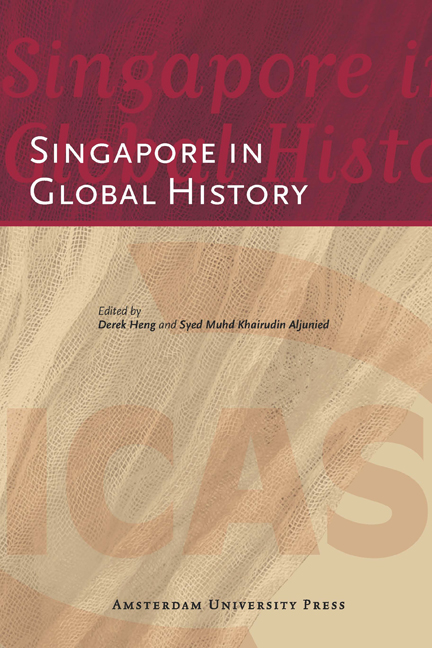Book contents
- Frontmatter
- Contents
- List of Tables and Illustrations
- Foreword
- 1 Globalising the History of Singapore
- 2 Situating Temasik within the Larger Regional Context: Maritime Asia and Malay State Formation in the Pre-Modern Era
- 3 The Singapore River/Port in a Global Context
- 4 ‘Walls of Illusion’: Information Generation in Colonial Singapore and the Reporting of the Mahdi-Rebellion in Sudan, 1887-1890
- 5 The Littoral and the Literary: Making Moral Communities in the Straits Settlements and the Gold Coast in the late Nineteenth and Early Twentieth Century
- 6 Social Discourse and Economic Functions: The Singapore Chinese in Japan’s Southward Expansion between 1914 and 1941
- 7 The Dynamics of Trans-Regional Business and National Politics: The Impact of Events in China on Fujian-Singapore Tea Trading Networks, 1920-1960
- 8 Rambutans in the Picture: Han Wai Toon and the Articulation of Space by the Overseas Chinese in Singapore
- 9 The Global Effects of an Ethnic Riot: Singapore, 1950-1954
- 10 The British Military Withdrawal from Singapore and the Anatomy of a Catalyst
- 11 Bringing the International and Transnational back in: Singapore, Decolonisation, and the Cold War
- 12 The Global and the Regional in Lee Kuan Yew’s Strategic Thought: The Early Cold War Years
- 13 A Brief History of the Hub: Navigating between ‘Global’ and ‘Asian’ in Singapore’s Knowledge Economy Discourse
- About the Contributors
- Bibliography
- Miscellaneous Endmatter
13 - A Brief History of the Hub: Navigating between ‘Global’ and ‘Asian’ in Singapore’s Knowledge Economy Discourse
Published online by Cambridge University Press: 02 February 2021
- Frontmatter
- Contents
- List of Tables and Illustrations
- Foreword
- 1 Globalising the History of Singapore
- 2 Situating Temasik within the Larger Regional Context: Maritime Asia and Malay State Formation in the Pre-Modern Era
- 3 The Singapore River/Port in a Global Context
- 4 ‘Walls of Illusion’: Information Generation in Colonial Singapore and the Reporting of the Mahdi-Rebellion in Sudan, 1887-1890
- 5 The Littoral and the Literary: Making Moral Communities in the Straits Settlements and the Gold Coast in the late Nineteenth and Early Twentieth Century
- 6 Social Discourse and Economic Functions: The Singapore Chinese in Japan’s Southward Expansion between 1914 and 1941
- 7 The Dynamics of Trans-Regional Business and National Politics: The Impact of Events in China on Fujian-Singapore Tea Trading Networks, 1920-1960
- 8 Rambutans in the Picture: Han Wai Toon and the Articulation of Space by the Overseas Chinese in Singapore
- 9 The Global Effects of an Ethnic Riot: Singapore, 1950-1954
- 10 The British Military Withdrawal from Singapore and the Anatomy of a Catalyst
- 11 Bringing the International and Transnational back in: Singapore, Decolonisation, and the Cold War
- 12 The Global and the Regional in Lee Kuan Yew’s Strategic Thought: The Early Cold War Years
- 13 A Brief History of the Hub: Navigating between ‘Global’ and ‘Asian’ in Singapore’s Knowledge Economy Discourse
- About the Contributors
- Bibliography
- Miscellaneous Endmatter
Summary
Singapore: a knowledge economy?
Since the 1990s, the concept of a ‘knowledge economy’ has been used by the Singapore government as a way of rationalising and anticipating the next phase of the country's development. Economically, it was intended to mark the transition from one phase of production – a labour and materialintensive industrial economy – to one based on research and knowledge production. By doing so, the government hoped that it would further differentiate Singapore from the other countries of the region, which were experiencing the Asian Economic Miracle and thus becoming economically competitive. The knowledge economy had grander implications as well, particularly in terms of cultural processes. Here it can be noted that under the knowledge economy a range of factors – physical, social and ethnic landscapes, business models and practices, national identity, Singaporeans, and the concepts of foreign, local and cosmopolitan – all became reconfigured for life in the 21st century. Thus various arms of the government leapt into action, churning out policy directives on industry, labour, information and communications technology (ICT) and media that would take Singapore to the next level. On the ground, the government courted investors, partners and talent with generous grants and research infrastructure, cleaned up its intellectual property regimes, and emphasised a new model of Singaporean- as-entrepreneur.
From the policy perspective, Singapore's knowledge economy extended and adapted a pre-existing narrative of progressivist developmentalism. Like many of its other national campaigns, the knowledge economy has been framed by a logic of technical-bureaucratic rationality. According to Singapore's political leaders, the knowledge economy is seen in terms of continued national economic growth, competition, and identifying areas of comparative advantage, particularly in the light of increasing competition unleashed by the wake of the Asian Economic Miracle. The knowledge economy is therefore predicated on this overused aphorism: Singapore, unlike its neighbours, has no natural resources, only its people and an advantageous geographical location. Fortunately because of the ability of its political leadership, investment and developmental assistance from First World countries, and the calibre of its human resource, it has been able to prosper without natural resources or an economic hinterland.
- Type
- Chapter
- Information
- Singapore in Global History , pp. 269 - 290Publisher: Amsterdam University PressPrint publication year: 2012



